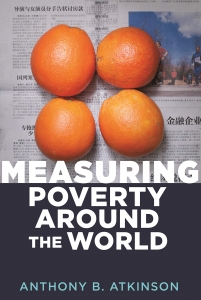Book Review | Measuring Poverty Around the World by Anthony B. Atkinson, edited by John Micklewright and Andrea Brandolini
The meticulous and passionate editorial work of John Micklewright and Andrea Brandolini has enabled the publication of Measuring Poverty Around the World, a posthumous opus from Anthony B. Atkinson, a leading and inspirational authority in the field of poverty and inequality. This book demonstrates the strength of Atkinson’s legacy for future generations of poverty scholars and underscores how the centrality of poverty to the political debate makes its measurement both a vital and delicate task, writes Roberto Iacono.

Picture: lloorraa from Pixabay
Measuring Poverty Around the World. Anthony B. Atkinson, edited by John Micklewright and Andrea Brandolini. Princeton University Press. 2019.

The British economist Sir Tony Atkinson (1944–2017) was an authority in the field of poverty and inequality, inspiring communities of scholars and significantly impacting the world of policy. In this posthumous opus, recently published following Atkinson’s passing in 2017 thanks to meticulous and passionate editorial work by John Micklewright and Andrea Brandolini, Atkinson summarises his life contributions to the field of poverty. In this review, I will try to do justice to the broad scope of the book, although I will concentrate relatively less on Chapters Six to Nine, which focus on poverty in specific regions of the world (Asia and the Pacific, Africa, Latin America and the Caribbean as well as in rich countries), as this section is unfortunately left relatively more incomplete than the rest. Atkinson had also planned to build a bridge in the book from the focus on poverty and inequality to the related issues of economic growth and climate change. These two aspects have been elegantly covered in the two Afterwords by leading scholars Francois Bourguignon and Nicholas Stern.
One of the overarching aims of Measuring Poverty Around the World is to highlight how the centrality of poverty to the political debate makes its measurement a delicate and important task. Throughout the book, Atkinson carefully pins down the steps required for meaningful and well-informed poverty measurement: from the various definitions of poverty, to analysing the key role of data and, finally, bridging monetary and non-monetary poverty measures. Among all the sentences summarising Atkinson’s view on the subject, my choice falls on these:
The measurement of poverty is not a purely technical subject. This book is not like a guide to plumbing, because the right answers depend on views that are politically influenced and, at heart, matters of moral judgement. They are influenced by culture and history (212).
(I let the reader judge the contrast between this view and Esther Duflo’s 2017 lecture, ‘The Economist as Plumber’, in which she advocates that ‘economists should seriously engage with plumbing’.)
Another underlying message of the book regards the importance of the linkage between assessing the performance of governments (through careful poverty measurement) and political action. Atkinson underlines that highlighting the lack of progress in tackling poverty around the world has the important effect of reminding governments of their responsibility in providing better solutions. Statistical evidence on poverty motivates political action. In Atkinson’s own words: ‘The ability to monitor progress is the first prerequisite for effective action’ (4).
In discussing ‘Why should we be concerned’ about poverty in a sub-section of Chapter One, Atkinson analyses ‘instrumental’ versus ‘intrinsic’ motivations. Whilst instrumental concerns are related to the direct consequences for one’s wellbeing from living in an unequal world, the intrinsic motives are more related to ethical and moral judgements that lead to worry for the ‘distant poor’. Atkinson seems to disregard the ground for instrumental concerns (10), claiming that the causal connection between poverty and inequality on the one hand and social problems on the other, is a tough one to establish. In my view, instrumental reasons should be kept as an important part of the motivation for being concerned with poverty, regardless of which method one employs to establish the connection between poverty and a broader array of social problems. Relying on both intrinsic and instrumental motivations would, in other words, provide a broader rationale for the fight against poverty all around the world.
As regards intrinsic concerns, Atkinson depicts two opposing standpoints. On the one hand, the ‘isolationist’ view of the world focuses exclusively on the wellbeing of individuals within a given society/country, assigning a null weight to the ‘distant poor’. In contrast, the ‘global cosmopolitan’ view assigns the same weight to each and every individual, hence implying equal care about the levels of poverty and forms of deprivation in every corner of the globe. In between these extreme views, the ‘limited sympathy’ perspective recognises the importance of eliminating deprivations around the world; however, it gives greater weight to tackling poverty at home. Although in my opinion Atkinson’s inclination in the book lends itself relatively more towards the ‘global cosmopolitan’ view, he does not forget to cite and give justice to the reasons behind other perspectives.
One distinctive feature of the book is the attempt to link the measurement of poverty carried out by international organisations (the World Bank and the United Nations Development Programme (UNDP) among others) to domestic estimates provided by the national statistical offices, and to analyse the reasons behind potential discrepancies between the two. This is done in the final part of the book, which comprises national reports of the estimates of poverty for 60 countries. The painstaking work by Atkinson in setting up these reports, in which poverty and inequality estimates by the World Bank are compared with estimates by the national statistical offices, provides an important reference for scholars and policymakers interesting in the specific country cases. The scope of this exercise is not purely instrumental, in the sense that Atkinson believed that bridging the two dimensions is crucial for the reliability of global and domestic estimates. In addition, by travelling back from global to local estimates of poverty, the concept of poverty gains domestic political relevance and makes its measurement (at any level) more accountable.
The book also comprises a long and detailed overview of the rationale behind the development of non-monetary measures of poverty: for instance, multidimensional poverty and deprivation indices (such as the Multidimensional Poverty Index (MPI) by the Oxford Poverty and Human Rights Initiative (OPHI) and its recent Global counterpart). Interestingly, Atkinson does not see monetary and non-monetary poverty measures as providing two distinct pictures, and shows in Chapter Five how the two approaches instead strengthen each other (160). In other words, he demonstrates that for most regions of the world the incidence of non-monetary deprivation appears to be higher where the level of monetary poverty is higher, confirming the importance of income as a determinant of wellbeing.
Towards the end of the book in Chapter Nine, Atkinson returns to an issue that has been central to his research: namely, incorporating poverty in both poor and rich countries into a single ‘global poverty measure’ (Atkinson and Bourguignon, 2001). His view is that estimating poverty by taking into account societal standards which differ across countries, rather than applying the same International Poverty Line (IPL) across the globe, enriches the definition of global poverty. The approach advocated is rather simple: selecting the IPL (currently $1.90 in purchasing power parity terms) as the threshold for monetary poverty in countries with low mean consumption, whilst the bar for monetary poverty rises linearly with mean consumption per head in richer countries (hence focusing on relative poverty in richer countries rather than its absolute version). In this way, one can get relatively more meaningful estimates of the number of poor individuals in the world, avoiding the uncomfortable result that poverty is absent in rich countries since barely anyone has a consumption below the IPL. Based on this approach, Atkinson estimates that the number of individuals in the world living in poor households was between 1.22 and 2.02 billion in 2013 (depending on the choice of the gradient for relative poverty in richer countries). This truly ‘global’ poverty measure builds on the ‘global cosmopolitan view’ put forward by the author in Chapter One, since tackling poverty is given equal importance at home as abroad. As opposed to this, the ‘limited sympathy’ view would entail that, for each country, we have a nationally specific count of world poverty, since citizens of a given country would assign lower value to tacking poverty in faraway countries.
One minor weakness of the book is the complexity of its structure, with general topics (such as ‘growth, inequality and poverty reduction’) being treated within the chapters devoted to poverty in specific regions of the world, rather than standing alone in dedicated chapters.
In conclusion, the main lesson to be learned from this book is that poverty is a non-static and multifaceted concept, continuously requiring new ways of thinking and a greater diversity of approaches, both when it comes to interpretation and its measurement. The legacy of Sir Tony Atkinson for the future generations of poverty scholars is strong and clear, and I personally look forward to seeing its impact in the decades to come.
This review gives the views of the author, and not the position of Democratic Audit. It was first published on the LSE Review of Books blog.
Roberto Iacono is an Associate Professor in Economics and Social Policy at the Norwegian University of Science and Technology (NTNU). His latest research is at the intersection between Public Economics, Labour Economics and Political Economy, with a focus on (i) economic inequality and (ii) policy-relevant questions related to the ‘Nordic model’ of economic development and welfare. Roberto Iacono is also Managing Editor of the Journal of Income Distribution (JID).





 Democratic Audit's core funding is provided by the Joseph Rowntree Charitable Trust. Additional funding is provided by the London School of Economics.
Democratic Audit's core funding is provided by the Joseph Rowntree Charitable Trust. Additional funding is provided by the London School of Economics.